Would you love to explore Rwanda?
Speak with one of our Rwanda experts today

Ben

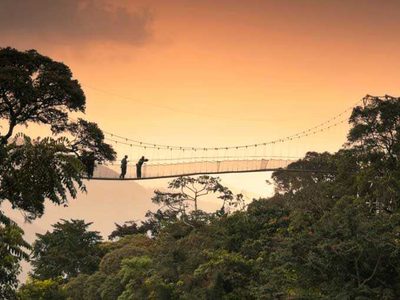
Tucked away in the southwest corner of Rwanda near the border with Burundi, lies Nyungwe Forest National Park - this ancient forest is the largest mountain rainforest on the entire African continent and is thought to be one of the oldest and one of the best preserved. When you set foot in this untouched tropical world and you’ll discover rich diversity beneath and amongst the dense rainforest canopy.
Sprawling for over 1,000 km² Nyungwe Forest holds remarkable biodiversity containing 13 different primate species including chimpanzee, blue monkey, golden monkeys and owl-faced monkeys – to name just a few. Nyungwe is home for up to 20%-25% of all the primates in Africa, which certainly makes it a great destination for wildlife enthusiasts who are looking for a safari holiday to Rwanda with many endemic species being found in this striking national park.
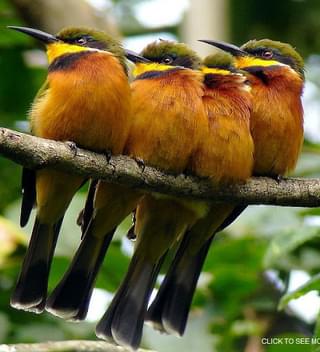
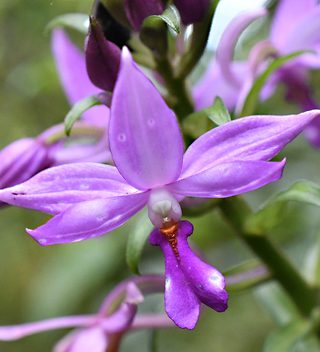
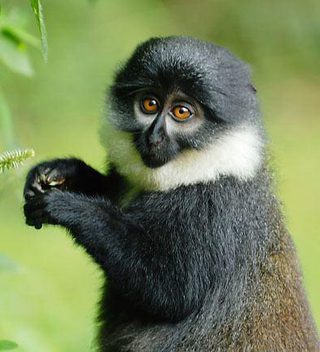
An inspiring journey through picturesque Rwanda taking in some of the very best that this vibrant country has to offer - it can easily be tailored to give you, your perfect journey whether you are looking for a fascinating adventure or luxurious, romantic honeymoon.
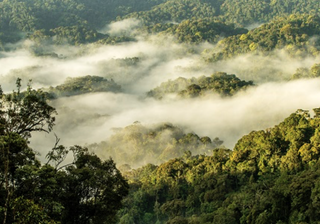
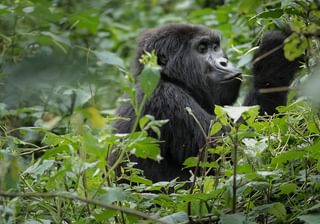
Highlights
9 nights from £6,240pp including international return flights all transfers and transportation, private professional experienced English-speaking driver/guide, all excursions and activities (including 1x Rwanda gorilla trekking permit per person, 1x Rwanda chimp trekking permit per person, 1x Rwanda golden monkey permit per person), national park permits/fees and full-board accommodation.
The forest commands exquisite vistas across the rainforest canopy are nothing short of magical, whilst below the canopy giant ferns and orchids cover the forest floor. Nyungwe is home to networks of walking trails, offering superb bird, butterfly and primate trekking opportunities. Many of the routes traverse fern-lined ravines and babbling streams – it all feels remarkably naturally pristine, wild and untouched.
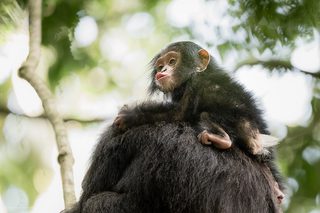
They may be nowhere the same size as the fuzzy black titanic mountain gorillas but there is no denying the affinity that we humans have for chimpanzees. Sharing an estimated 94% DNA similarity, chimps display an incredible range of human-esque behaviours ranging from tool use to waging war with rival communities.
Chimps are highly sociable and one of the few primates to form complex communities which can reach upwards of 100 individuals. During the day chimpanzee communities break down into smaller groups and forage for food, a behaviour that has been dubbed ‘fission-fusion’ by anthropologists.
When going on a chimpanzee trekking adventure, you need to be prepared for a potentially lengthy hike up to several hours even before you encounter them. Since they can cover a greater daily distance than the relatively docile gorilla, chimpanzee tracking can be quite strenuous especially if they are on the move when you encounter them and you’d be surprised how adeptly they move through the forest either on the ground or through the tree branches. As with gorilla trekking experiences, once your group finds the chimpanzees, you’ll have one hour to spend with them. It may see like a short time, but this is ample time and is for the benefit of the chimps. Minimising the risk of passing on any infectious human illnesses as well as ensuring their natural behaviour isn’t impacted too heavily.
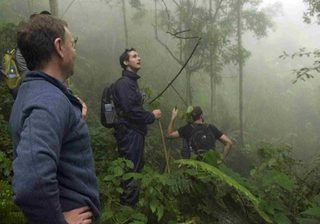
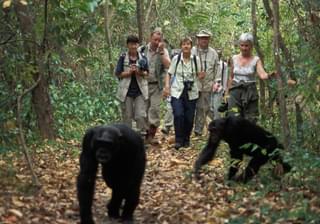
A marvellous experience in its own right but Chimpanzee habituation in Nyungwe is still very much a work in progress, and although you will almost certainly encounter them, it might not be all that close up. However, the vegetation on the forest floor is much less dense than in the Virunga mountains where the gorillas live, so the walk is generally a little less tiring. In the rainy season you have a good chance of successfully tracking the chimps on the coloured trails (a network of trails of varying levels of difficulty), though in the dry season they have a tendency to head for higher elevations meaning lengthier walks.
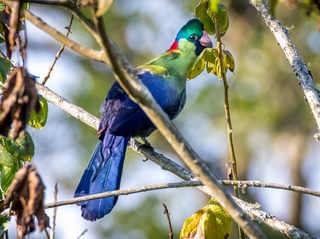
Nyungwe has something of a legendary status among birdwatchers when they head to East Africa. It is by far the country’s top spot for birdwatching with over 300 species, which include nearly 30 Albertine Rift Valley endemic species including Rwenzori turacos as well as other large forest species such as African crowned eagles, various hornbill and the Congo Bay owl.
There are a number of specialist birding guides based in Nyungwe who need to be booked in advance for specialist birdwatching trips and depending on what you hope to see, the guide will choose appropriate trails that maximises your chances of ticking off as many ‘lifers’ as possible.
Even driving through forest will present great opportunities to spot species such as mountain buzzards, cinnamon-chested bee-eaters, numerous sunbirds, wagtails and flocks of beautiful yet tiny waxbills.
Nyungwe Forest really is a top-notch, must do destination for anyone who has even the slightest interest in birds. In fact, even if you’re not, whilst you’re in the area you’ll probably develop a new found interest as you start to tick off species after colourful species.

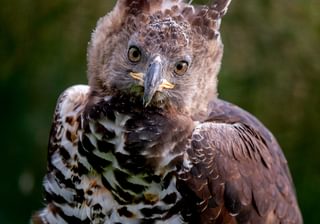
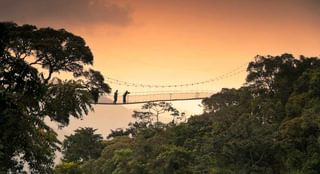
One of the newest additions to the experiences available to Nyungwe Forest visitors. The canopy walk is in essence, a guided, hour long stroll on a 200 meters long trail suspended at over 50 meters above the forest canopy and is an exhilarating activity. The views at the top gives you an eagle’s perspective with stunning panoramic views over the lush rainforest. You’ll have great opportunity to spot tonnes of wildlife, myriads of colourful butterflies, birds and potentially primates which seldom venture to the lower levels of the forest such as blue monkeys and red-tailed monkeys.
At some sections of the canopy walk, the bridge crosses a deep valley with no sight of the ground below which can present a thrilling experience for those not worried about heights! For safety reasons, children below the age of 6 years are not allowed to go on the canopy walk.
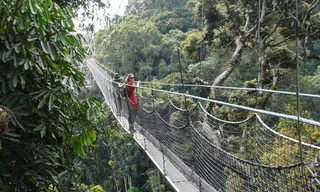
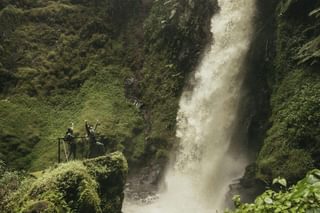
Another of Nyungwe Forest’s popular activities and are a feast for the senses as you are expertly guided along some of the forests stunning trails. There are several trails throughout the forest which are colour-coded to guide hikers through the beautiful forest where they can learn all about the hundreds of different tree, butterfly and orchid species as well as being able to fully appreciate the calmness of the forest. The nature walks are usually around three hours in length and are under the guidance of expert local guides.
The nature and waterfall treks usually start at the peripheral of the forest with trails descending into the amphitheatre of the rainforest with the murmurs of rivers intermingled with bird, frog and insect calls creating a truly wonderful soundtrack to the walk. Ferns, lichens and an abundance of wildflowers and orchids provide an opulent visual feast washing striking colours throughout the rainforest.
Nyungwe Forest’s most famous waterfall is Kinyarwanda which stands at just under 20 meters in height and is surrounded by myriads of stunning plants, caves and overhanging cliffs – and on bright sunny days you’ll be treated to rainbows created by the spray and mist rising from the thundering waters.
It isn’t uncommon to see a diverse range of primates and birds around the waterfalls so be prepared for a simply wonderful nature experience.
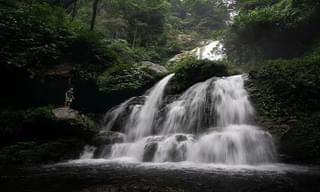
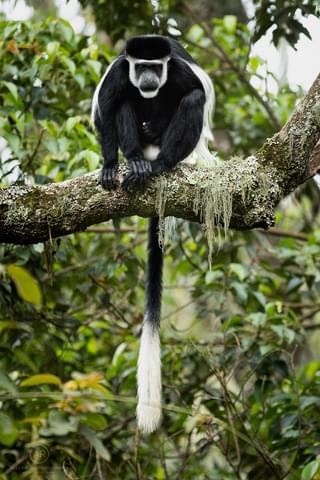
With over a dozen different species of primates besides the infamous chimpanzee, there are numerous other primate treks that guests of Nyungwe Forest can go on to discover the myriad of species which call the forest home.
Lease treks are far less strenuous than chimpanzee trekking but still very much worth taking the time to go on. Nyungwe Forest is home to around 25% of all primate populations in Africa, which is a staggering amount and has the highest concentration of colobus monkey on the continent.
During these guided walks, you’ll explore any number of Nyungwe’s thirteen different trails as you’re ushered in to the world of Grey-cheeked mangabeys, L’heost monkeys, Owl-faced monkeys, blue monkeys and Mona monkeys – to name just a few.
Generally these primate walks last anywhere between two and four hours depending on the success rate of finding amazing wildlife.
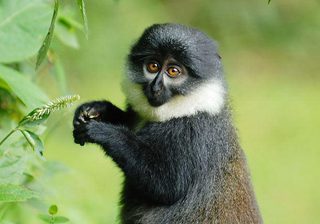
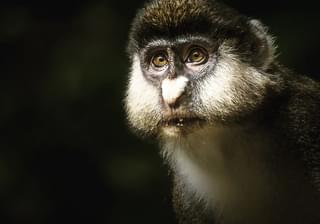
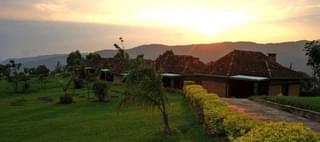
From its hilltop vantage point, Top View has beautiful views across the neighbouring forest and tea plantations, and its proximity to the headquarters of Nyungwe Forest National Park makes it is a good base for trekking to see the chimpanzees and exploring the forest.
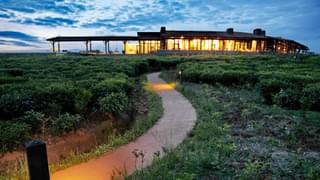
Nyungwe House, owned by The One & Only Collection, is surrounded by an expanse of lush green tea plantations
The lodge is an impressive, remote property with modern accommodation in a great location for primate tours. As you would expect from the One&Only gorup, this has a modern, stylish and sophisticated feel and all the comforts a remote hotel can afford.
As recently as October 2020, African Parks, a non-profit conservation organisation founded in 2000, in response to the dramatic decline of wildlife and protected areas in Africa, took over the management of Nyungwe Forest with the new agreement putting in place strategies to create substantial and meaningful opportunities in the local area by expanding wildlife and conservation management infrastructures as well as increasing tourism and community projects in the region.
This partnership is a testament to the work already carried out between the Rwandan government and African Parks in Akagera National Park (Rwanda’s only big five reserve).
Read more about Rwanda’s investment in conservation and community projects
If you would like to learn more about mountain gorilla trekking, exploring Nyungwe Forest and the ‘land of a thousand hills’ – speak with one of our Rwanda travel experts and we can help you create your ultimate wildlife experience.
Wondering when to visit? Take a look at this guide on the best time to visit Rwanda.
Looking for some more inspiration? Take a look at our best safari holidays ideas, our favourite family safaris, our big five safari guide or our top African safari honeymoon suggestions.
Speak with one of our Rwanda experts today

